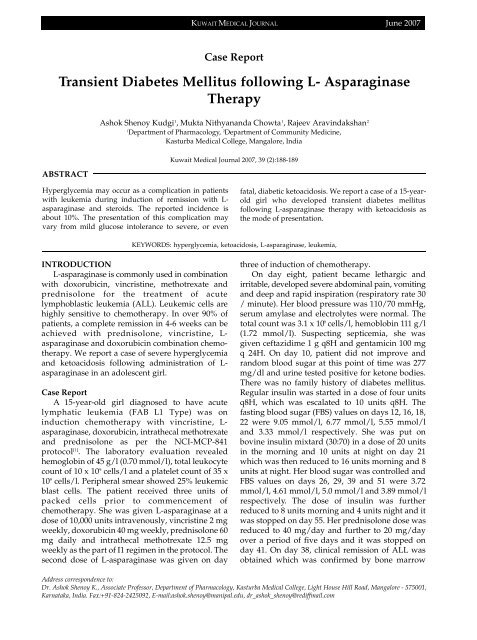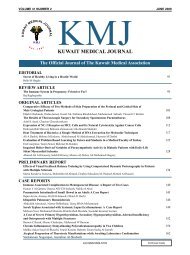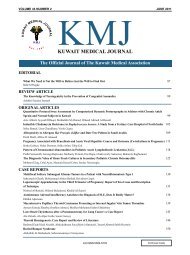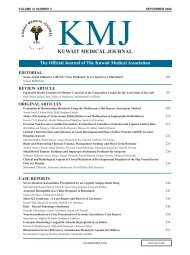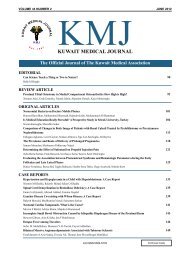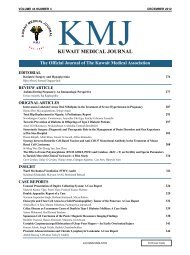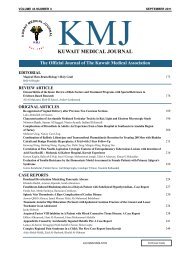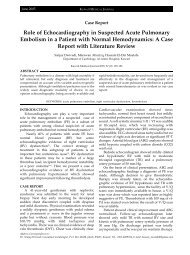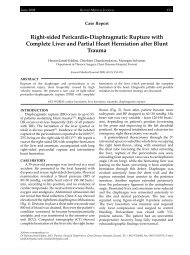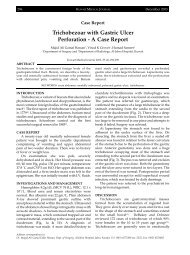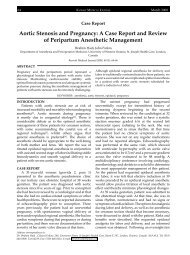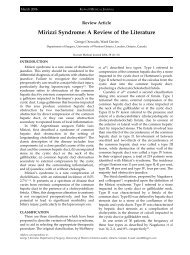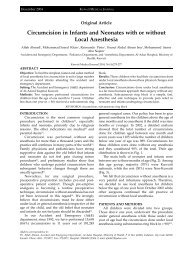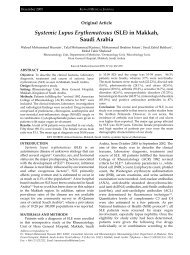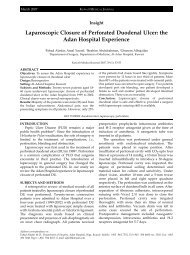Vol 39 # 2 June 2007 - Kma.org.kw
Vol 39 # 2 June 2007 - Kma.org.kw
Vol 39 # 2 June 2007 - Kma.org.kw
- No tags were found...
You also want an ePaper? Increase the reach of your titles
YUMPU automatically turns print PDFs into web optimized ePapers that Google loves.
KUWAIT MEDICAL JOURNAL <strong>June</strong> <strong>2007</strong>Case ReportTransient Diabetes Mellitus following L- AsparaginaseTherapyABSTRACTAshok Shenoy Kudgi 1 , Mukta Nithyananda Chowta 1 , Rajeev Aravindakshan 21Department of Pharmacology, 2 Department of Community Medicine,Kasturba Medical College, Mangalore, IndiaKuwait Medical Journal <strong>2007</strong>, <strong>39</strong> (2):188-189Hyperglycemia may occur as a complication in patientswith leukemia during induction of remission with L-asparaginase and steroids. The reported incidence isabout 10%. The presentation of this complication mayvary from mild glucose intolerance to severe, or evenfatal, diabetic ketoacidosis. We report a case of a 15-yearoldgirl who developed transient diabetes mellitusfollowing L-asparaginase therapy with ketoacidosis asthe mode of presentation.KEYWORDS: hyperglycemia, ketoacidosis, L-asparaginase, leukemia,INTRODUCTIONL-asparaginase is commonly used in combinationwith doxorubicin, vincristine, methotrexate andp rednisolone for the treatment of acutelymphoblastic leukemia (ALL). Leukemic cells arehighly sensitive to chemotherapy. In over 90% ofpatients, a complete remission in 4-6 weeks can beachieved with prednisolone, vincristine, L-asparaginase and doxorubicin combination chemotherapy.We report a case of severe hyperglycemiaand ketoacidosis following administration of L-asparaginase in an adolescent girl.Case ReportA 1 5 - y e a r-old girl diagnosed to have acutelymphatic leukemia (FAB L1 Type) was oninduction chemotherapy with vincristine, L-asparaginase, doxorubicin, intrathecal methotre x a t eand prednisolone as per the NCI-MCP-841p ro t o c o l [ 1 ] . The laboratory evaluation re v e a l e dhemoglobin of 45 g/l (0.70 mmol/l), total leukocytecount of 10 x 10 9 cells/l and a platelet count of 35 x10 9 cells/l. Peripheral smear showed 25% leukemicblast cells. The patient received three units ofpacked cells prior to commencement ofchemotherapy. She was given L-asparaginase at adose of 10,000 units intravenously, vincristine 2 mgweekly, doxorubicin 40 mg weekly, prednisolone 60mg daily and intrathecal methotrexate 12.5 mgweekly as the part of I1 regimen in the protocol. Thesecond dose of L-asparaginase was given on daythree of induction of chemotherapy.On day eight, patient became lethargic andirritable, developed severe abdominal pain, vomitingand deep and rapid inspiration (respiratory rate 30/ minute). Her blood pressure was 110/70 mmHg,serum amylase and electrolytes were normal. Thetotal count was 3.1 x 10 9 cells/l, hemoblobin 111 g/l(1.72 mmol/l). Suspecting septicemia, she wasgiven ceftazidime 1 g q8H and gentamicin 100 mgq 24H. On day 10, patient did not improve andrandom blood sugar at this point of time was 277mg/dl and urine tested positive for ketone bodies.There was no family history of diabetes mellitus.Regular insulin was started in a dose of four unitsq8H, which was escalated to 10 units q8H. Thefasting blood sugar (FBS) values on days 12, 16, 18,22 were 9.05 mmol/l, 6.77 mmol/l, 5.55 mmol/land 3.33 mmol/l respectively. She was put onbovine insulin mixtard (30:70) in a dose of 20 unitsin the morning and 10 units at night on day 21which was then reduced to 16 units morning and 8units at night. Her blood sugar was controlled andFBS values on days 26, 29, <strong>39</strong> and 51 were 3.72mmol/l, 4.61 mmol/l, 5.0 mmol/l and 3.89 mmol/lre s p e c t i v e l y. The dose of insulin was furtherreduced to 8 units morning and 4 units night and itwas stopped on day 55. Her prednisolone dose wasreduced to 40 mg/day and further to 20 mg/dayover a period of five days and it was stopped onday 41. On day 38, clinical remission of ALL wasobtained which was confirmed by bone marrowAddress correspondence to:Dr. Ashok Shenoy K., Associate Professor, Department of Pharmacology, Kasturba Medical College, Light House Hill Road, Mangalore - 575001,Karnataka, India. Fax:+91-824-2425092, E-mail:ashok.shenoy@manipal.edu, dr_ashok_shenoy@rediffmail.com


